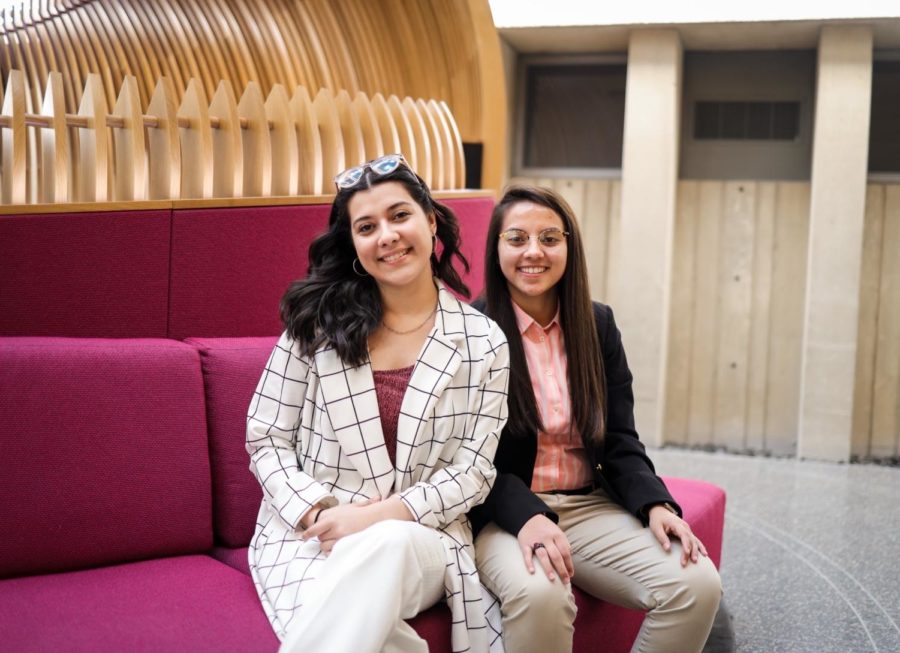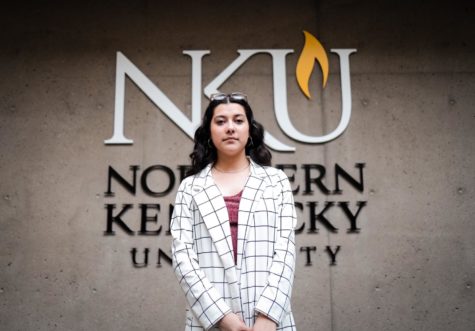Your donation will support the student journalists of Northern Kentucky University. Your contribution will allow us to purchase equipment and cover our annual website hosting costs.
Cabrera, Romo: serving the student body through excellence, truth and service as SGA president and VP
March 27, 2022
Junior criminal justice major with a minor in psychology Brittney Cabrera and junior construction management major Jacky Romo are running for SGA president and vice president for the 2022-23 academic year.
Who they are
Both Cabrera and Romo are Latino women who have noticed the lack of representation of their community throughout campus which is what set fire to the flame to announcing their candidacy for SGA president and vice president.
“I feel like there’s not enough of us on campus. There’s not enough women representation in roles like this. I think we’ve always felt so strong about our community and our backgrounds and that shows within LAMP (Latino Mentor Program) and LULAC (United Latin American Citizens),” Romo said.
Cabrera feels her leadership positions and initiatives taken have prepared her to take on the role of SGA president if elected. She was the one who brought LULAC back to campus three years ago after she had noticed the program wasn’t as active as it could have been.
Cabrera is currently LULAC’s president, involved in TRIO, Victor Guide, was one of the first students to serve within the DEI Council and served as a senator for SGA for the duration of a semester.
Romo is currently a member of LULAC, Alpha Psi Lambda’s (a co-ed Latino fraternity) president, an ambassador for the Haile College of Business, is a member of the DEI Committee for the College of Business and NLS (Norse Leadership Society).
Being president of another organization, Romo said she understands the responsibilities and duties those in leadership positions have to fulfill, which makes her ready to step in as SGA vice president. She was very new to Greek life when nominated internal vice president of her fraternity back in April of 2020 before switching to treasurer and most recently taking on her current role as president.

“I didn’t know what came with it [IVP] … But obviously, people were nominating me and were putting their trust in me which was for a reason. So I took that and ran with it,” Romo said. “Alpha Psi Lambda has been the number one organization that has shed that leadership light onto me to essentially know what it takes and what comes with a president and vice president role as well.”
Both Cabrera and Romo are head peer mentors for LAMP where they strive to enhance and promote the academic success and retention of incoming Latino freshman.
Their platform
Excellence, truth and service are the three main platforms that Cabrera and Romo have built their campaign around.
Excellence is focused around ensuring that students have all the necessary resources to be successful.
“Regardless of your major, regardless of your sexual orientation, we want everyone to feel like they have a safe space, a safe space in their major and in organizations and that they have a variety of options to choose from,” Cabrera said. “We want to make sure that while they are balancing their academic success, they are also being aware socially of the injustices that are happening not only within the world right now, but within campus.”
Truth is Romo’s favorite platform because it shows transparency from within student government to the student body, which she feels is one of the most important things one can center a platform around.
“If we are elected, I want our student body to feel like they can come to us with honest and open concerns and say, ‘Hey, I’m being real honest with you right now, this is how I’m feeling within my college, this is how I’m feeling as a student, this is how I’m feeling as an individual,’” Romo said.
Their last platform, service, is built upon being leaders within the campus community.
“We want everyone to feel like they’re connected with the community they are around. They are connected with food and service opportunities, connected with scholarship opportunities,” Cabrera said. “We are there for them. We are there to serve the student body. We are there to voice what they want. We are servants for them and we want them to understand that what we do is what they want; not what we think they want, not what is in our head, not what past people wanted to do.”
Their platform also stems off of Kentucky House Bill 231 which, if passed, would “prohibit postsecondary educational institutions from enrolling, employing or contracting with illegal aliens, require postsecondary educational institutions to keep records of immigration status and provide for the withholding of state funding from postsecondary educational institutions that enroll, employ or contract with illegal aliens.” This bill would also require local law enforcement agencies and the Kentucky State Police to enforce all laws among other things if passed. The last known action of the bill was on Jan. 6.
Both Cabrera and Romo share similar experiences with having parents who are immigrants. With that shared experience came the thought of The U.S. Immigration and Customs Enforcement (ICE) showing up at their homes while growing up and putting their families at risk.

“My entire life I’ve been scared of immigration coming to my house and my family being at risk. I’ve always lived in this box, where now I’m like, ‘I have this privilege of being a citizen. I have this privilege of going to get an education. I have all of this stuff. Why not use what I have for people who don’t have that? Why not advocate for those who are within the state of Kentucky and not even just NKU?’” Cabrera asked.
Romo said only her parents and siblings reside in Kentucky, whereas the rest of her family are either in Mexico or on the other side of the country.
“It’s crucial, it’s real. Even as a U.S. citizen and as a documented person, it’s so scary because that’s the rest of my family … My parents are all I’ve known and I wouldn’t know what to do without them. Those are my parents at stake. Those are my siblings at stake. Those are my peers and classmates at stake and the people that we mentor at stake, so I think it’s important to raise awareness and understand that even though we might have the privilege to be here to get this higher education, it’s still scary,” Romo said.
What sets them apart
Cabrera said her and Romo’s willingness to listen to the student body is what sets them apart from the other slates of candidates.
“We actually care; we don’t care for the title, the popularity, we couldn’t care less about that. We have seen the problems in our three years of being here. We have heard about problems from faculty and staff. We have heard about problems from our students, and nobody’s doing anything. We have seen administrations act on or prey on the vulnerabilities of those who they campaign to,” Cabrera said.
Romo said her being part of the LGBTQ+ community helps diversify her own perspectives as well as both Cabrera and Romo being minority races.
“A key thing is not only being two women running for these positions, but being two Latino women running for these positions is another thing that makes us different. I as an LGBTQ+ identifying person think that’s also a plus because not only am I Latina, not only am I a woman, not only am I lesbian, I think it’s all just there; a little bit of everything comes into play,” Romo said.
The slate feels that they have been listeners around campus to many different communities and are willing to take the steps if elected as SGA president and vice president to represent the true student voices across campus that may be left unheard at times.
“We hear them [students’ voices] because we know them. We understand them. It is not just for the power,” Cabrera said. “[And] if no one were to do it, who is going to do it? If not us, then who?”
SGA elections will take place March 30 and 31. Students can vote here by clicking “Vote for SGA candidates here”. At the time of publication, the link to vote was not functioning properly.


